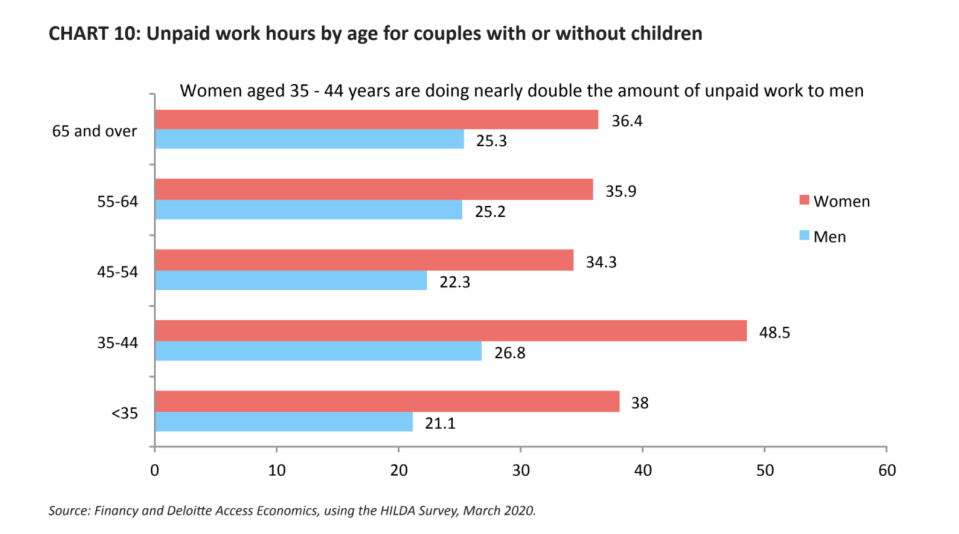‘Vicious cycle’: Coronavirus dents equality

Coronavirus has devastated industries across Australia, but women have suffered the brunt of the blow, new analysis reveals.
Also read: ‘Oldie but goldie’ money advice for dealing with Covid-19
Also read: More specific goals, less risk: How women approach investing differently to men
Also read: How will we pay for coronavirus?
Of the 19 sectors of the economy, women have lost more jobs than men across 14 sectors, while there were only five sectors where men suffered the majority of the job cuts, Australian Bureau of Statistics data has found.
And this has worrying implications for gender equality, the quarterly Financy Women’s Index Report has revealed today.
The index, which measures women’s financial progress, rose just 0.4 per cent to 71.3 points in its lowest first-quarter reading since 2015.
“[And] the real worry… is that we're at least 32 years away from seeing [financial equality] and that could well get worse because of the impact of Covid-19,” Financy founder and CEO Bianca Hartge-Hazelman told Yahoo Finance.
What’s driving the setback?

The first quarter of 2020 saw the slowest growth in the index since September 2018, led by a severe slowdown in female employment growth.
In fact, full-time job numbers were up just 0.1 per cent, compared to male full-time employment growth of 0.9 per cent.
Simultaneously, the female unemployment figure rose by 5 percentage points to 5.2 per cent in March from February, while the male unemployment rate remained at 5.3 per cent.
A large factor behind this is the fact that women tend to occupy more casual and part-time positions, particularly younger women, women older than 50 and women who are raising children.
Unfortunately, Hartge-Hazelman said, these casual roles are often the first to go in times of financial hardship, borne out by recent ABS data.
“It's a real concern,” she said.
Chief economist Ernst & Young Oceania Joanna Masters agreed, expressing concern that women’s economic progress slides back to due to the economic downturn and “perhaps diverted focus”.
“A key concern is through the labour market, with where and how women work likely leaving them more exposed to job and income loss today, but also in years to come as economic scarring impacts opportunity,” said Masters.
Unpaid work a barrier
“Even in unpaid work, where we've made gains, that's likely to change [due to coronavirus],” Hartge-Hazelman said.
The gender gap in unpaid work shows women in relationships carry out 60 per cent more unpaid work than men, with this figure considered a barrier to women’s work participation.
In 2018, the average woman in a relationship did 38.9 hours of unpaid work a week, while the average man did 24.3 hours.

And remote learning, remote working and the fact that the whole family is now permanently at home has meant the number of hours of unpaid work carried out by women will likely also increase.
“That [unpaid work] might become another barrier to prevent female workforce participation which affects wages, which flows into everything,” she said.
“It's like a vicious cycle that we're experiencing at this point in time, and I'm very concerned about the longer term economic impacts of Covid-19.”
Opportunities to change

But the Covid-19 pandemic also presents opportunities for Australia to change.
“If female employment recovers more slowly than male employment, that would tend to widen the unpaid work gap. On the other hand, if men get more involved in home life during the shutdown, new habits may form that persist beyond the shutdown,” said co-author of the HILDA survey, which collects data on unpaid work, Roger Wilkins.
Hartge-Hazelman agreed, noting that this period could lift the veil on the distribution of labour in the home.
“I do feel that men are going to be exposed to the amount of unpaid work, and will have less excuses not to see it,” she said.
And there’s good data too - many men are doing more at home with remote learning, home improvements and more conversations are being had about the division of unpaid labour.
“It’s not all negative here in terms of the economic impact. There's a great potential for the gender divide to close on unpaid work,” she said.
“But we need to be aware of the economic impact that it's having on the jobs front at the same time.”
On top of that, there are opportunities for Australia to “lift the gender lens” on flexible working plans. Women have typically sought out more flexible and remote work plans than men, but widespread remote work could change that.
Retirement savings a looming risk
The critical element is superannuation savings. Women already retire with 31 per cent less in their retirement savings, due to a combination of lower wages, greater casual and part-time work trends and breaks from the paid workforce to undertake caring roles.
Covid-19 threatens to further exacerbate that divide.
The median account balance for women is $45,000, compared to $65,000 for men.
And as more women lose their jobs, the temptation to access their superannuation early is also greater, posing more questions about the adequacy of Australian women’s super at retirement.
“As a society, governments, and businesses - we need to be really aware of the impact this could have on women.”
She said the government may need to consider more initiatives to keep women in work, and also rethink the way superannuation engages with women.
For example, Australians who take breaks from the paid workforce can later make “catch up” superannuation payments. Hartge-Hazelman said career breaks shouldn’t be a reason to allow women to make catch up payments, and the ability to make catch up payments should just be applied to women in general.
“Covid-19 could slow the process of economic empowerment of women, the gender equality push for women,” she said.
This concerned Hartge-Hazelman the most: that after years of #MeToo and #TimesUp, a pandemic could send women back.
“I wasn’t expecting such a social knock on the head after a rapid amount of social change,” she said.
“Covid-19 could really derail the momentum towards women’s empowerment, or at least stall the progress that we’ve seen. I don’t want that to happen. We need to keep the conversation active, and think about how are we going to help women in affected industries at this time to ensure that they can get back on their feet and progress.”
Join the Yahoo Finance Women's Money Movement 2020 on LinkedIn.
Follow Yahoo Finance Australia on Facebook, Twitter, Instagram and LinkedIn.




